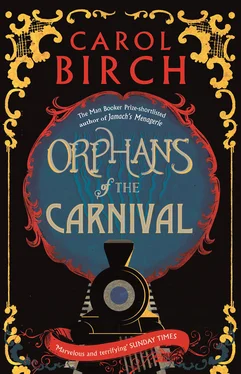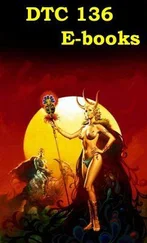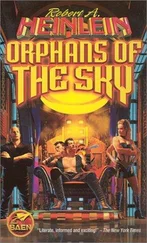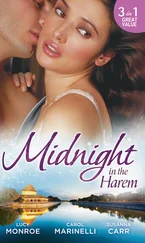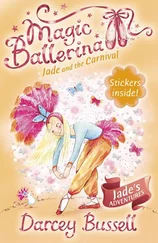‘It’s only Cato,’ Michael said.
He was all face and not enough head. What there was of his head was dark brown and exaggeratedly egg-shaped, bald and tapering to a point like a dunce’s cap.
Seizing her hand in his little stick fingers, he spoke urgently in a high voice that broke and stuck and skidded nasally, drowning any words.
‘So tiny,’ she said.
His fingers were hot and squirmy. His face pushed itself avidly at her with a massive width of smile. A fat black woman in a guinea-blue skirt and white blouse appeared in the doorway of the kitchen, a wooden spoon steaming in her hand. ‘Come on now, Cato,’ she said patiently, ‘you get back now.’
‘He likes people,’ Michael said, looking back over his shoulder. ‘You never saw a pinhead before?’
‘Never.’
She stared into the shiny crinkling eyes, wanting unaccountably to unveil.
‘He’s just a big baby,’ Michael said.
‘Cato!’ the cook called.
Mewing excitedly, Cato ran back to the kitchen. His breeches were cut off at the knee. His legs were thin, bent sticks and his feet were too big. He put his head very far back and smiled up at the cook as if he was trying to break his face.
‘Here we are.’ Michael was lugging her grip through an open door. Charlotte, a frail thin-faced girl, stood back and waved her on in, staring at the veil as if trying to see through.
‘Thank you,’ Julia said. Wouldn’t you just love to know what’s under here? She looked around. It was plain but comfortable. Someone had tried to make it nice with blue flowers in a jug and a clean yellow tablecloth. A game of patience was abandoned on a side table. Two narrow beds were neatly turned down, and a pink curtain was half drawn back on a rail of wide, brightly coloured skirts. Michael put her grip down. Charlotte drew back another curtain, heavy grey linen. ‘You in here,’ she said. ‘You sleep here and put your things in there. You want chocolate?’
‘I’d love some,’ said Julia.
‘Look,’ the girl said. ‘You got a window.’
It was open for the air but covered with a net. Another net was round her bed. Veil on veil on veil.
‘I’ll bring you some chocolate,’ said Charlotte, staring blatantly. ‘You’ll want hot water too, I guess.’
The boy didn’t look at her at all.
When they’d gone, she tore off the veil and tossed it onto the bed. She was dazed. Three weeks and she’d be on a real stage in a theatre. What have I done? She got under the net and lay down on the narrow bed with her hands over her face, moaning softly. I should have gone back to the mountains, she thought. When she was little she thought the mountains were full of people like her, that there was a place up there where all the women were hairy and had more teeth. And it had occurred to her to just set off, take that path she clearly remembered, along which her mother had walked away. The path rose first gently and then, in the distance where everything turned blue, very steeply.
Where was the girl with the chocolate and the hot water? She jumped up again and stood at the window listening to the sounds beyond the end of the street, a muffled hum, a whistle, a rumble and a call. The Mississippi, how far away she didn’t know, not far, she’d seen it from the train, the big steamboats paddling up and down with people on the upper decks with hats and parasols. I am a woman who’s been on a train, she told herself. I’m in a great city. I’m going to New York. I could go anywhere.
A baby cried somewhere, out along the back alley.
She’d met Rates the day of the wedding. She’d been called from the kitchen to sing and play her guitar. All the doors and shutters were thrown open to the patio. Everyone was there, all the bright sparkling crowd of them, the boys, the young men and their wives, Doña Inés, her mouth held in the tight way she had when she was pretending not to be drunk, all the young bucks and flowery girls, and the children, some of whom had not seen her before. This was a particular treat for them. But it was nothing. She’d been stared at since she’d come into the world. She wore her red dress, a red flower in her hair, stood before the bank of paper flowers and strummed on her guitar, the same old thing she’d learned on, red and scratched. She sang ‘Llorona’ and ‘La Chapparita’, then laid the guitar aside, took up her harmonica and played for Doña Inés, ‘ A La Nanita Nana’, and everyone sang along. Afterwards Don Pedro came forward, kissed her hand and held it and stood smiling before the crowd. ‘My dear friends, Señorita Julia Pastrana!’ he said, and they cheered and laughed and some gave her sweets and little gifts. Listen to her! That voice coming out of that face ! One lady gave her a necklace made of blue stones. ‘I think you’re miraculous,’ the lady said. The mamas brought their babies in their arms to look at her, and she smiled and smiled. One child was afraid and screamed and was carried away by his scolding sister, saying ‘Oh, Enzo, making such a fuss. Señorita Pastrana will think you’re very rude.’
‘Not at all,’ said Julia, but the girl did not hear. Poor little boy, she thought, will he wake screaming, with a great jerk, seeing me in the dark?
‘Who taught her to sing?’ someone asked.
Will he try and try to put my face from his mind and be unable, and wish he’d never seen me? Will I have him waking in a sweat still when he’s a man grown up with his own babies?
‘I did,’ said Marta, who’d changed out of her wedding gown and put on a green-and-white dress over several layers of frothy lilac petticoat. She had not taught Julia to sing. Julia had always sung. She’d sung around the Palace as a child, sung as she worked, sung as she fixed a hem. She never showed herself unless she was called, and these days she was not called upon so much, usually only when Don Pedro had a visit from some important somebody with silk lining in his cuffs. And if that important somebody or that important somebody’s wife had heard of her and wanted to see her, she’d come out when they were sitting with their cigars and brandy, all ready and waiting and agog, in her red dress with a red flower in her hair. That had been Don Pedro’s idea, but she liked it. Red flower, black hair. Or purple bougainvillea from the vine growing along the boys’ balcony. Hool ya! Hool ya! Calling her to the patio. Hool ya! Hool ya! Summoning her to entertain them.
Rates had appeared in front of her, a round-faced man in late middle age with a prissy little mouth and the plump chin of a great baby. He was in company with an intense boy, one she remembered, one of those who got the pull, whose eyes got stuck on her in a troubled way.
‘Señorita Julia,’ the boy said, ‘you did not dance.’
She wasn’t at her best; she was tired. She’d been up long before light with the other servants. It had been a horrible day. She’d been crying because of the blue dress. If she was very careful, she could cry without anyone knowing, letting the tears hide one by one, strictly controlled, in the hair beneath her eyes. This was useful.
‘Not tonight,’ she replied.
‘I saw you dance once before.’
She smiled politely.
‘I wish you would have danced,’ he said stubbornly, his eyes steady.
‘Shall I dance for you now?’ She smiled, picked up her skirts and did a couple of swirls, backwards and forwards, side to side, stamping her feet and finishing with arms akimbo. A cheer went up from those close by who saw. The older man applauded.
‘You have talent,’ he said with a slight bow of the head. A Yank, by his accent.
‘Thank you, Señor.’
‘Didn’t I tell you?’ The boy spoke with an air of great seriousness. ‘She’s remarkable. She speaks English, Uncle. And you ought to see her dance. The way she points the toe.’
Читать дальше
